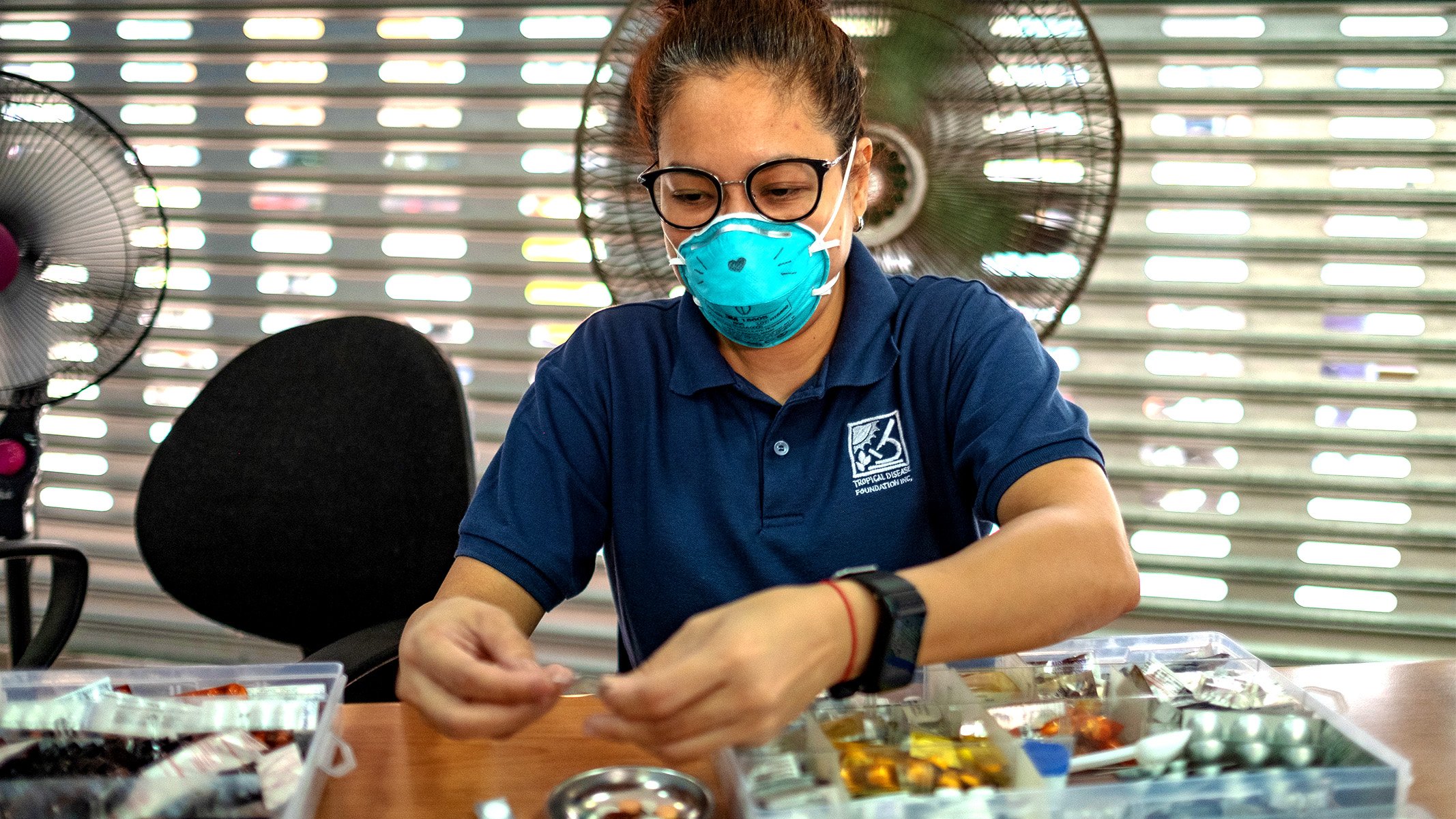Clinical Trial Results Presented at CROI 2023
Clinical Trial for Drug-Sensitive and Drug-Resistant TB Regimen Evaluated Shorter Regimens
A clinician from the SimpliciTB trial in the Philippines preparing treatment for a clinical trial participant in 2019.
SEATTLE (February 20, 2023)—Results of TB Alliance’s SimpliciTB clinical trial were presented today at the 30th annual CROI 2023 conference. SimpliciTB was conducted to evaluate the BPaMZ regimen, consisting of bedaquiline (B), pretomanid (Pa), moxifloxacin (M), and pyrazinamide (Z). This combination previously showed high efficacy and treatment shortening potential in both preclinical evaluations and an early-stage clinical study in drug-resistant patients.
SimpliciTB enrolled 455 patients with drug-susceptible (DS) or drug-resistant (DR) tuberculosis (TB) at 26 sites across eight countries: South Africa, Tanzania, Georgia, Brazil, Russia, the Philippines, Uganda, and Malaysia.1 The clinical trial was designed to evaluate the safety and efficacy of BPaMZ in patients with either DS-TB or DR-TB. As presented at CROI, the results of the trial showed that the BPaMZ regimen was highly potent against the TB bacteria, meeting its primary endpoint with DS-TB participants 2.93 times more likely to culture convert by week 8. However, the 4-month experimental BPaMZ regimen did not meet the secondary endpoint of noninferiority in percent favorable outcomes compared to 6 months of HRZE in DS-TB. This was due to adherence challenges, with approximately 10% of patients on the BPaMZ arms discontinuing treatment due to side effects.1
“Innovative clinical trials like SimpliciTB help us better understand how novel drug regimens work against both drug-sensitive and drug-resistant TB, lighting the way to better treatment options for all people with TB,” said Dr. Muge Cevik, infectious diseases clinician and researcher at the University of St. Andrews and presenter of the SimpliciTB trial results at CROI 2023.
In 2021, 10 million people were infected with TB and about 1.6 million people died. It is estimated that about 500,000 people every year are infected by a drug-resistant form of the disease, and in some regions as many as 40% of all cases are drug-resistant.2 Novel drug regimens are urgently needed to help bring the TB pandemic under control.
TB Alliance plans to submit data from SimpliciTB to a peer-reviewed publication.
About Tuberculosis Active TB must be treated with a combination of drugs; the most drug-sensitive forms of TB require at least four months of treatment using four anti-TB drugs. An estimated 1.6 million people died of TB in 2021,2 according to the World Health Organization (WHO), although the precise numbers are not known and recent research suggests that TB could have killed many more people.2
Drug-resistant TB develops when the long, complex, decades-old TB drug regimen is improperly administered, or when people contract TB from others who have drug-resistant disease—highlighting the urgent need to develop better and shorter treatment regimens. Only an estimated one third of people with drug-resistant TB infections received treatment in 2021.2
About TB Alliance TB Alliance is a not-for-profit organization dedicated to finding faster-acting and affordable drug regimens to fight TB. Through innovative science and with partners around the globe, we aim to ensure equitable access to faster, better TB cures that will advance global health and prosperity. TB Alliance operates with support from Australia’s Department of Foreign Affairs and Trade, Bill & Melinda Gates Foundation, Foreign, Commonwealth and Development Office (United Kingdom), Cystic Fibrosis Foundation, Germany’s Federal Ministry of Education and Research through KfW, Global Disease Eradication Fund (South Korea), Global Health Innovative Technology Fund, Indonesia Health Fund, Irish Aid, Korea International Cooperation Agency, Medical Research Council (United Kingdom), National Institute of Allergy and Infectious Diseases, Netherlands Ministry of Foreign Affairs, South Korea’s Ministry of Foreign Affairs, United Kingdom Department for International Development, and the United States Agency for International Development. SimpliciTB was funded in part by the European & Developing Countries Clinical Trials Partnership (EDCTP) through a grant to the TB research team at the University of St Andrews. For more information, please visit: www.tballiance.org.
Bedaquiline was developed and is manufactured by the Janssen Pharmaceutical Companies of Johnson & Johnson
References
Cevik M.(2023) February 20. SimpliciTB Results and Hepatic Safety of Pretomanid Regimens +/- Pyrazinamide [Conference presentation]. CROI 2023.
World Health Organization (2022). Global TB Report 2022. Available at: https://www.who.int/teams/global-tuberculosis-programme/tb-reports/global-tuberculosis-report-2022

